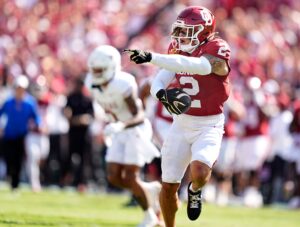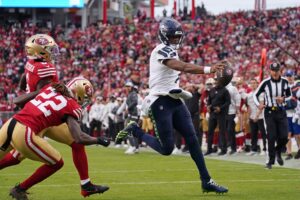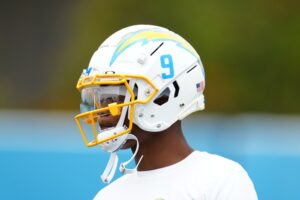Fantasy football championships can be lost because of the failure of a first-round draft pick. It is important to avoid busting with an early round selection, especially at the very top of round one. The first overall pick of a snake draft brings the added pressure of waiting a significant period of time before making the next pick. The player selected first overall should have the highest possible floor and represent the player most likely to retain their first-round value. In 2018, the player that should be selected first overall, regardless of format, is Dallas Cowboys running back Ezekiel Elliott.
Making the Case for Drafting Ezekiel Elliott First Overall in Fantasy
Over his first two NFL seasons, Ezekiel Elliott’s per game averages have been historically great. When comparing the averages of the other running back options for the first overall pick, Elliott’s all-around efficiency clearly stands out.
| Player | Total Games | Total Yards | Receptions | TDs |
| E. Elliott | 25 | 129.9 | 2.32 | 1.0 |
| L. Bell | 29 | 119.8 | 4.41 | 0.66 |
| D. Johnson | 32 | 98.6 | 3.62 | 1.0 |
| T. Gurley | 29 | 86.4 | 2.2 | 0.55 |
Elliott has the highest yards per game average and is tied with Arizona’s David Johnson with one total touchdown per game. Many fantasy owners will point to Elliott’s perceived lack of involvement in the passing game, but his usage during his first two seasons compares favorably to the Rams’ Todd Gurley.
Elliott (2016-2017): 58 receptions, 632 yards, three receiving touchdowns
Gurley (2015-2016): 64 receptions, 515 yards, no receiving touchdowns
Dallas is committed to increasing Elliott’s receiving usage and that will mean a huge leap in pass-catching production during his third season.
Ezekiel Elliott’s pass down usage skyrocketed in 2017 (26.7 routes per game, per PFF) compared to his rookie season (17.6 RR/G).
For reference:
• David Johnson averaged 31.8 RR/G in 2016
• Le’Veon Bell has 33 RR/G the last two years
• Todd Gurley averaged 24.5 RR/G in 2017— Graham Barfield (@GrahamBarfield) June 7, 2018
Offensive Line
There is a symbiotic relationship between a lead running back and his offensive line. The best offensive line of the fantasy running back options is certainly Elliott’s. As per PlayerProfiler.com, here are the run-blocking efficiency rankings for the top four projected fantasy running backs.
| Team | 2016 OL Rank | 2017 OL Rank |
| Dallas | 2nd | 5th |
| L.A. Rams | 24th | 1st |
| Pittsburgh | 3rd | 9th |
| Arizona | 7th | 10th |
The Cowboys offensive line was expected to take a step backward last year after losing both Ronald Leary and Doug Free but still managed to finish as a top-five run-blocking unit. Dallas fired offensive line coach Frank Pollack and replaced him with long-time Cincinnati Bengals offensive line coach Paul Alexander in an effort to reestablish their spot as the top overall NFL offensive line.
The Cowboys have three perennial Pro Bowl lineman in left tackle Tyron Smith, center Travis Frederick, and right guard Zack Martin. According to Pro Football Focus, last season Martin graded out as the top run-blocking guard, Frederick the second-best run-blocking center, and Tyron Smith as the seventh best run-blocking tackle. In addition, the Cowboys signed tackle Cameron Fleming from New England and drafted Texas guard Connor Williams in the second round of the 2018 NFL draft. The Cowboys’ perennial premier offensive line is a huge reason Elliott has the safest floor of any fantasy running back.
Game Script Agnostic
Here at the NFL team rushing totals over the last two seasons:
| Team | Rushing Yards: 2016-2017 |
| Dallas | 979 |
| Buffalo | 979 |
| Carolina | 943 |
| New England | 930 |
| Jacksonville | 919 |
| Philadelphia | 911 |
| Minnesota | 881 |
| Denver | 867 |
| Indianapolis | 860 |
| Los Angeles Rams | 829 |
| Baltimore | 827 |
Over the last two seasons, the Cowboys have 979 team rushing attempts, tied for most in the league with the Buffalo Bills. It’s important to note that Dallas had a 13-3 and 9-7 record in those respective seasons. Translation? Regardless of overall team success, the Cowboys entire offense is committed to running the football.
This off-season, Dallas chose to cut All-Pro wide receiver Dez Bryant. Their current veteran receiving personnel has achieved limited NFL success.
| Player | Total Games | Rec PG | Rec. Yds PG | Total TDs |
| A. Hurns | 52 | 3.63 | 51.3 | 21 |
| T. Williams | 87 | 2.91 | 29.8 | 20 |
| T. Austin | 75 | 2.59 | 22.5 | 21 |
| C. Beasley | 87 | 2.91 | 29.8 | 20 |
| D. Thompson | 53 | 1.45 | 19.4 | 4 |
This group is the least accomplished wide receiver corps in the NFL. Dallas drafted rookie wide receiver Michael Gallup from Colorado State in round three of the NFL Draft but still failed to acquire a top free agent wide receiver. When you add in a tight end group with a grand total of nine career NFL receptions, the personnel clearly supports the narrative that Elliott will be the featured offensive option.
The Difficulty of Repeating as a Top-Five Fantasy Running Back
The fantasy running back position experiences extreme year-to-year volatility. Over the last ten years, very few players have produced consecutive top-five PPR finishes.
Repeating as Top 5 Fantasy RB is not easy
Here are PPR RBs who finished Top 5 in consecutive seasons last 10 yrs:
M. Jones-Drew (08-09)
A. Peterson (09-10)
L. McCoy (10-11)
A. Foster (10-12) 3 YRS
R. Rice (11-12)
M. Lynch (12-14) 3 YRS
M. Forte (13-14)
L. Bell (16-17)— Mike Randle (@RandleRant) June 5, 2018
Regardless of the impact of randomness on these results, it is worth noting that only 16 percent (eight out of 50) running backs were able to repeat a top-five PPR performance. Only two running backs (Arian Foster and Marshawn Lynch) were able to produce three years in a row, and none accomplished it four consecutive years. Last year’s top five PPR fantasy running backs were as follows.
| Player | Total PPR Points |
| T. Gurley | 383.3 |
| L. Bell | 341.6 |
| A. Kamara | 315.4 |
| K. Hunt | 295.2 |
| M. Gordon | 288.1 |
The trend suggests that at least three of those running backs will not make the list this season. Selecting Todd Gurley or Le’Veon Bell as the top overall pick should make fantasy drafters cautious. With only 10 games played last season, Elliott is completely fresh for the 2018 season while still only 22-years-old.
End of Season Fantasy Schedule
It is always an advantage to have your best players at home during the stretch drive of the fantasy season. This season, Dallas has one of the most favorable late-season schedules of any NFL team.
Teams with home heavy Fantasy Football end of season 2018 schedules:
Carolina: Home 15 & 16
Dallas: Home 12, 13, 14, 16
Indy: Home 15 & 16
Miami: Home 13, 14, 16
NYJ: Home 15 & 16
Oak: Home 13, 14, 16
SF: Home 14, 15, 16
Sea: Home 13, 14, 16
Ten: Home 13, 14, 16— Mike Randle (@RandleRant) April 20, 2018
Dallas is the only team with four home games between Weeks 12-16. They host the Washington Redskins, New Orleans Saints, Philadelphia Eagles, and Tampa Bay Buccaneers during that time. While Philadelphia had a strong rushing defense last season, New Orleans and Tampa Bay were very mediocre, and Washington allowed the most rushing yards per game of any NFL team. Another observation from the above list? The Arizona Cardinals, Los Angeles Rams, and Pittsburgh Steelers are all not listed.
Summary
The first overall fantasy pick is both a blessing and a curse. Having the option of picking any fantasy player is great, but it cannot be a bust. With over 20 picks until the second round selection, a high fantasy floor is the most important criteria. When factoring in efficiency, offensive line, pass-catching usage, year-to-year results, and team end of year schedule, the first overall fantasy pick regardless of format should be Ezekiel Elliott.






